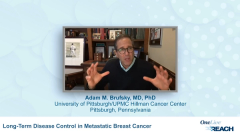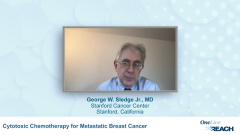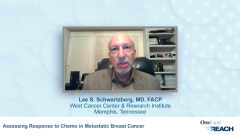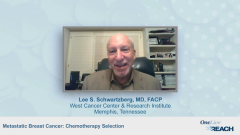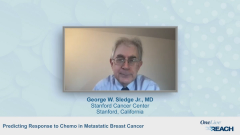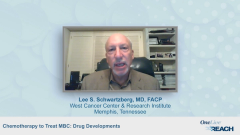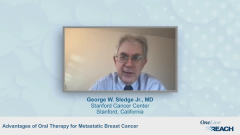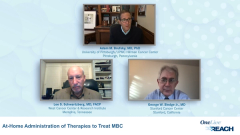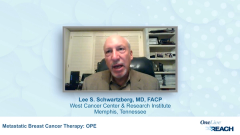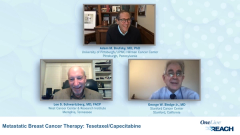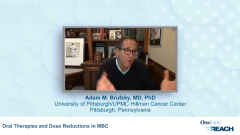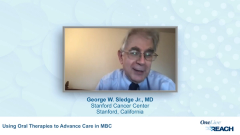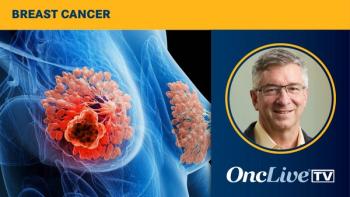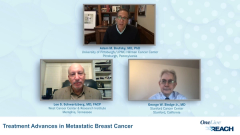
Chemotherapy to Treat MBC: Drug Developments
Episodes in this series

Adam M. Brufsky, MD, PhD: Let’s turn it a bit and talk about some innovations in chemotherapy that have happened. I would love to talk to you guys about ADCs [antibody-drug conjugates] because a lot of us are saying that this is the decade of the ADC and that sort of thing. Clearly, we started with Kadcyla [ado-trastuzumab emtansine]. At least in breast cancer, that was 1 of the first, but we now have trastuzumab-deruxtecan. I would like to know what you guys think of trastuzumab deruxtecan. Not only is this 1 where it will apparently work anywhere you have a target and deliver a chemotherapy payload to it, but all you need to do is have a certain percentage of the target for it to work.
What do you guys think of the data, especially in the San Antonio Breast Cancer Symposium. In the most recent update, it was 19.4 months. It was admittedly in phase 2, ready for phase 3, but that is a 19.4-month progression-free survival [PFS] in people who have had a median of 6 regimens. What you guys think of that?
George W. Sledge Jr., MD:Yes, it is pretty stunning, is it not? When we talk about drugs like TDXD [trastuzumab deruxtecan], T-DM1 [ado-trastuzumab emtansine], or sacituzumab govitecan—all the ADCs that have come along in the last few years—the payloads are, in essence, chemotherapy. Ultimately then, the drug resistance is going to be chemotherapy drug resistance.
Whether these will represent cures for metastatic breast cancer, I would say that is unlikely. They have certainly changed the field in a special way, and we have the opportunity to prolong life fairly hugely. Because there is no limit to the number of payloads that you can add to an antibody, we can expect further advances in this field going forward.
Lee S. Schwartzberg, MD, FACP: I would completely agree. We have gotten better even since T-DM1 [ado-trastuzumab emtansine], which is arguably the first ADC that we were using in breast cancer. We have gotten better in terms of technology: the linking technology and the payloads. The future is bright for this, and it is interesting work.
For example, with sacituzumab, the target is present on almost every cell, so we are not using it so specifically as a targeted therapy like we do in the HER2 [human epidermal growth factor receptor 2] area. That may also be true for TDXD [trastuzumab deruxtecan]. You may not need a lot of expression of HER2, and many cells have some. We will wait to see those results. It is another method of getting chemotherapy in. What is interesting, though, is at about the 19 months. To George’s point, I am struggling to understand how you do not get resistance from 19 months.
Adam M. Brufsky, MD, PhD: Yeah.
Lee S. Schwartzberg, MD, FACP: It may be back to what we started talking about, because there may be mechanisms there that we are not understanding. It may be an immune mechanism that is unique to that drug because even if it is just chemotherapy, if you deliver it effectively.
George W. Sledge Jr., MD:Some combination of chemotherapy plus ADC.
Adam M. Brufsky, MD, PhD: I would agree. It is interesting. When you look, there is an interesting abstract. I do not know if they published it yet. They looked at the genes that were associated with trastuzumab deruxtecan resistance. I do not remember who presented this. It was at ASCO [American Society of Clinical Oncology Annual Meeting] about 6 months ago, and they had the usual ones: If you had apparently circulating levels of HER2, then you would do better after a couple of months.
What was interesting was this: If you looked carefully at that abstract and looked at the other genes that came out, a lot of them had to do with all these weird immune genes like endosomal transport genes. It was weird. I agree. Something else is probably going on besides that, because I agree. Who gets a 16- or 19-month PFS without resistance to the underlying chemotherapy? That was the weird thing about it. That struck me.
Transcript Edited for Clarity


